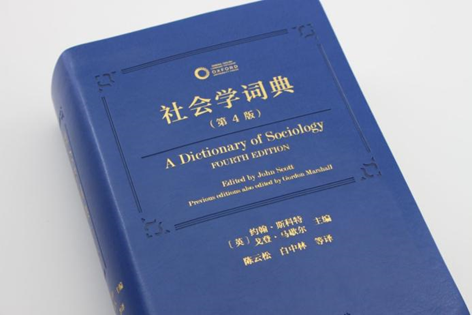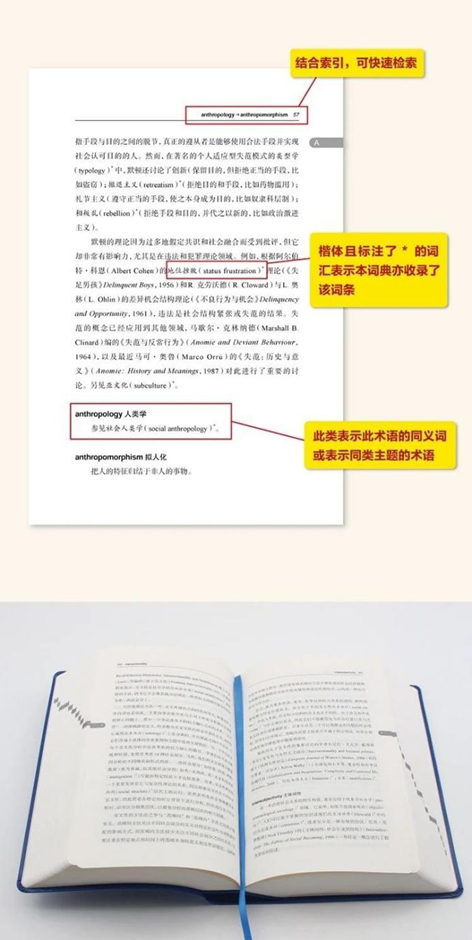In July 2024, the Chinese edition of A Dictionary of Sociology, a definitive disciplinary dictionary published by Oxford University Press, was released. It was edited by John Scott and Gordon Marshall and translated under the supervision of Professor Chen Yunsong and Professor Bai Zhonglin. The dictionary contains over 2,000 entries covering various fields of sociology, including education, gender, population, social stratification, healthcare, and religion, etc.. The dictionary also covers key terms and relevant scholars from classical sociology to contemporary sociology, and professions ranging from sociology to disciplines which sociology may overlap, such as psychology, anthropology, philosophy, political science, and economics, etc.. The dictionary aims to clarify and trace concepts, veins, and trends of sociology in a concise, condensed, and comprehensible manner with major points highlighted, serving as a handy reference tool for sociology professionals as a valuable aid for their study and research.


Preface of the Chinese Edition
"No culture thrives without a dictionary." This was the call made 108 years ago in A Brief Introduction of the Origin of Words (Ci Yuan Shuo Lye) by Lu Erkui (Eastern Miscellany, Volume 12, Issue 4, 1915), China's first modern lexicographer, who was also chief editor of Ci Yuan, the first modern Chinese dictionary. This fully indicates the crucial role modern dictionaries have played in China's modernization over the past century. As the cradle of China’s modern cultural publishing industry, Commercial Press has since started its grand journey in compiling and translating dictionaries. The reference book kingdom of Commercial Press is built upon multiple dictionaries ranging from dictionaries of words to dictionaries of phrases, from specialized ones to encyclopedic ones, even comprehensive dictionaries.
Till today, the dictionary business of Commercial Press continues to advance deep into academic fields. The translation of A Dictionary of Sociology, which was originally published by Oxford, carried out by young Chinese sociology scholars we had gathered, is not only a notable contribution to the vast collection of Commercial Press reference book, but also one to the development of sociology as a discipline in China. A well-established discipline requires not only academic associations and journals but also fully fledged handbooks, research guides, and dictionaries. In building an independent knowledge system of Chinese sociology, it is crucial that we understand Western sociology, learning from and absorbing its outstanding achievements while making appropriate sublation. This dictionary becomes our first choice after comparison with others and our deliberation for translation and introduction in China. On one hand, Oxford University's series of dictionaries in the humanities and social sciences are renowned in the publishing community, even in the whole English community; on the other hand, this specific dictionary enjoys a good reputation in the international sociology community. Considering reasons above, we communicated with the original editors and Oxford University Press respectively, receiving their approval and authorization. Our two leading translators not only participated in translating the main content but also took on tasks such as the translation and material supplementation of the preface and the appendix, as well as tasks to ensure the overall consistency of the dictionary. The entire work of translation, review, and publication took more than two years and we are grateful to everyone involved. Getting as many scholars involved in these works as possible surely guarantee the dictionary's acceptability, yet cannot be perfect. While the dictionary's entries are comprehensive, the introduction of achievements from Chinese and non-Western sociology is still far from adequate. Some definitions inevitably reflect personal biases and Western-centered perspectives of the original editors, which may contain prejudices or even errors of which Chinese readers should be mindful when using the dictionary.
Writer: Xi Zien
Reviser: Ma Jinge
